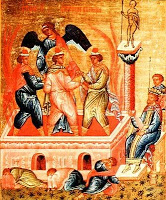In ancient times there was a commonly held belief by many peoples that gods only had power over certain lands. There might be a god who had power over Chicago, but if you went to Detroit you would have to offer sacrifices to another god. This was certainly the case in the ancient near east, the lands in which the stories of the Bible find their home.
In fact one could argue that many near eastern people believed it was easier for a god to be with them in death (Psalm 139:8) then in a foreign land.
This is one of the scandals of the Bible. Not only does it make the bold claim that there is one God, but it testifies that this God has a universal jurisdiction. God’s “right to rule” extends to all places and fills all things.
In other words God’s reign is universal, literally.
This truth is shown powerfully in the book of Daniel. Everyone of the first 5 chapters of the book seems to point to a new aspect of this.
God’s universal jurisdiction is first seen in the lives of his people. Daniel refuses to eat like the people of Babylon in the King’s courts (1:8). Most exiled peoples would adopt foreign customs, believing they were in a new land, and therefore a new god.
Not Daniel and his friends. Their lives demonstrate that although they were conquered, it did not mean that God had lost his footing in the universe. God was still God even in the land of the Chaldeans.
As the story continues the king, Nebuchadnessar, has a dream. Through the interpretation of Daniel we find this is a dream prophesies the destruction of his own kingdom (2:39) and the eventual reign of a universal kingdom, a kingdom of heaven (2:44).
The King’s response to this is incredible; he calls Daniel’s God the God of gods.
Why? Well this dream demonstrates that God has universal jurisdiction over All people (including the king), all time (including the future), and all places (yes even the whole Earth).
In chapter three there is another story that is recounted. It tells of three young men who are thrown into a blazing furnace because they refuse to bow down before a statue of the King. This story too shows us something God’s universal jurisdiction.
God miraculously saves them by not allowing the flames of the furnace to harm them. He in essence overturns the kings legal ruling. This shows that God has universal jurisdiction over justice.
As the narrative continues the we see God’s universal jurisdiction continue to be asserted first over rulers (4:31) and then over nations (5:26).
So do we stand under the rule of God? Unfortunately I often look at what the culture views as authority as somehow authoritative in my own life. This is not the message we see in Daniel, and it’s not the message we see in the rest of scripture either.
Look at the vision of the world we see in Matthew chapter five, or Luke chapter one. God sends the rich away empty, gives the world to the meek, and lifts up the lowly. As Psalm 138 tells us he is above all and can be found in all places.
I must not try to fit the patterns of a culture into my image of God, but rather I should try to submit to the patterns of God within a culture.
My question for you: How do we do this today? Can you give one practical way you’ve seen people submit to the rule of God?














